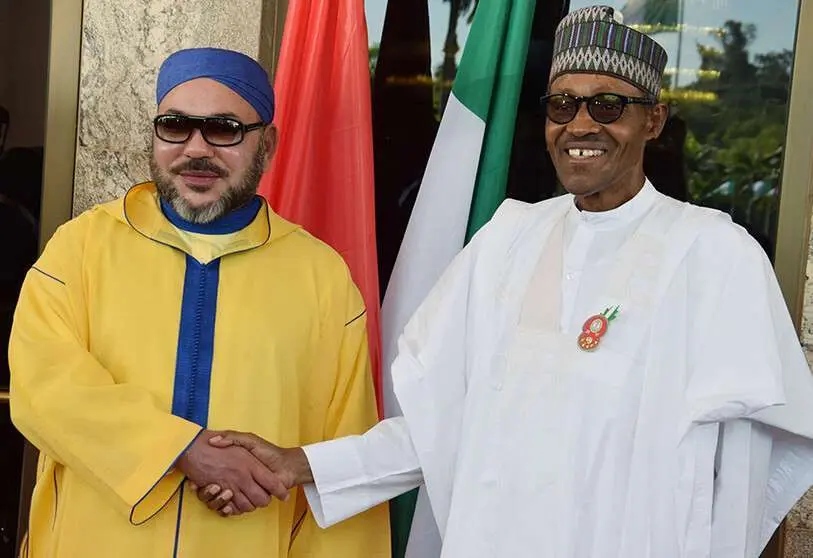Marruecos aprueba con Nigeria la ejecución de un gasoducto “sur-sur”

The director general of the Nigerian National Petroleum Corporation, Yusuf Osman, has announced that the federal government is preparing to build a gas pipeline linking Nigeria and Morocco. This construction was already announced in 2016, when the feasibility study for the construction of the pipeline was completed. The pipeline is intended to supply gas to at least 15 West African countries and reduce gas flaring in Nigeria, with the aim of diversifying the country's energy resources.
Representatives from both countries signed an initial agreement laying the groundwork for the future project. Nigeria's Foreign Minister Geoffrey Onyeama announced the partnership with the Moroccan government at a press conference in Abuja, the capital.

For their part, the King of Morocco, Mohamed VI, together with the Nigerian President, Muhammadu Buhari, reiterated their common determination to continue progressing and cooperating on energy projects. According to a statement released by the Moroccan Royal Household, "during these talks, the two Heads of State welcomed the positive dynamic in bilateral relations in all fields, since the Royal visit to Nigeria in December 2016 and that of President Buhari to the Kingdom in June 2018."
"President Buhari thanked His Majesty the King for the support of the Kingdom in the fight against terrorism and violent extremism, in particular through the training of Nigerian Imams at the Mohammed VI Institute for the Training of Imams, Mourchidines and Mourchidates", a measure that European countries such as Germany have implemented in order to reduce the influence of foreign imams who could spread radical ideas in the country.

With the approval of this project, Morocco intends to continue expanding its influence in the region and promote what is known as 'south-south cooperation' in order to favour the continent's development in both energy and economic terms. With this intention, the African continent would already have two important transnational gas pipelines, the West African Gas Pipeline and the Nigeria-Morocco gas pipeline, 5,660 kilometres long and with a budget of $25 billion.
According to the magazine, le Courrier d'Atlas, this megaproject will "optimise the cost of transporting gas that is currently transported after its transformation into liquefied natural gas (LNG)" and will have "a very positive impact on the other countries affected by the project" as they will be able to "have clean energy that can be invested in power stations and thus reduce their energy deficits that are holding back their socio-economic development".

Similarly, the gas pipeline between Morocco and Nigeria will allow the production of fertilisers for agriculture to be produced at competitive costs, thus contributing to the growth of this economic sector on the continent.
The construction of the new channel aims to compete with the Nord Stream 2 gas pipeline, which manages to double the gas supply between Russia and Germany. In this regard, Nord Stream 2 has not been free of controversy, as Washington has described it as a "risk to geopolitical security".
However, the United States, along with other European countries, is supporting other energy routes to curb Russia's dominance in this market, both at European and world level. Thus, the US agency Newslook has confirmed that the Nigerian-Moroccan project will respond to European and US interests and will benefit 30 million African inhabitants.

In addition, the pipeline will not only generate economic and social benefits. The establishment of this network is intended to curb the Russian giant and limit its power and influence in an energy sector from which Germany imports 30 per cent of its gas and oil. Now, with the Nigerian pipeline as an alternative, Russia may lose significant power in an oligarchic sector in which, until now, it has been the clear leader.
Former US Central Intelligence Agency official Norman Roll believes that the new viaduct will play an important role for the United States, Europe and Africa, as Morocco is emerging as a stable economic and political partner that could affect the status quo in the region with a new competitive country, this time from the East.

On the other hand, Mohammed VI has decided to put the brakes on negotiations to renew the gas pipeline with Spain, which is due to expire this year. This licence would have been established with the aim of transferring Algerian gas to the Iberian peninsula. However, the current diplomatic crisis between Spain and Morocco seems to be showing its medium- and long-term consequences. The agreement, which is expected to expire this November, will not be renewed.
The pipeline linked the Hassi R'Miel gas fields, located in the Algerian Sahara, with the Strait of Gibraltar, crossing Morocco. The project has been in operation since 1996 and, as a result of the diplomatic crisis, looks set to come to an end this year. Meanwhile, Algeria has already inaugurated a new gas pipeline in Beni Saf, capable of making up for the losses that would result from the end of the Moroccan-Spanish contract.

Experts continue to agree unanimously that economic, commercial and social benefits will continue to prevail in all the countries through which the new pipeline is expected to pass, namely Benin, Togo, Ghana, Ivory Coast, Liberia, Sierra Leone, Guinea, Guinea-Bissau, Gambia, Senegal and Mauritania. In this way, the project is a demonstration of Morocco's strong diplomatic relations with the countries of West Africa.
For its part, the Economic Community of West African States (ECOWAS) has welcomed the Moroccan-Nigerian gas pipeline, stating that the initiative will achieve "the superiority of mutual investment and economic cooperation between the countries", by promoting the development of economic sectors that would be strategic and a priority.










